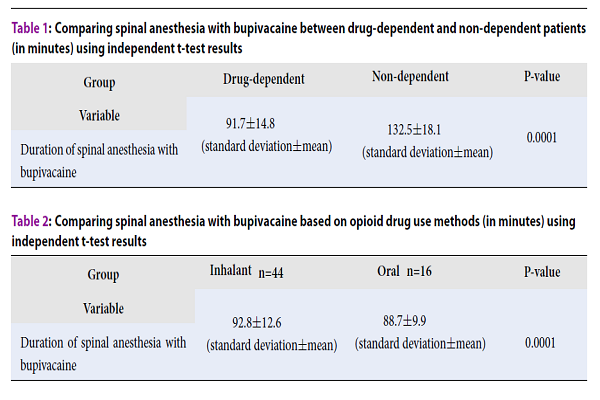Comparing the duration of spinal anesthesia with bupivacaine between drug-dependent and non-dependent patients
DOI:
https://doi.org/10.15419/bmrat.v5i10.486Keywords:
Bupivacaine, Drug-Dependent Individuals, Spinal AnesthesiaAbstract
Background & Aim: Drug abusers have much lower pain threshold, in a way that the duration of the effect of anesthesia on controlling their pain is still not fully known. Therefore, this study aimed to compare the duration of spinal anesthesia induced with bupivacaine between drug-dependent and non-dependent individuals.
Methods: This quasi-experimental study was conducted on two 60-member groups consisting of drug-dependent and non-dependent patients undergoing lowerlimb orthopedic surgery. Patients were selected via simple convenience sampling and underwent a similar procedure of spinal anesthesia using the same needle and medicine by an anesthesiologist, who was unaware of the patients' placement in the study groups. After surgery, the duration of patients' anesthesia was correspondingly measured in both groups and compared using the independent t-test.
Results: In this research study, no significant difference was observed between the groups in terms of age and gender. The mean duration of opium abuse in the drug-dependent patient group was reported to be 7.5+/-1.3 years. In addition, the duration of spinal anesthesia in the drug-dependent patient group was shorter, compared to the non-dependent group (P=0.0001).
Conclusion: According to the results of the study, intrathecal bupivacaine is not a durable anesthesia, for performing surgeries that might last more than an hour, in drug-dependent patients.

Downloads
Published
Issue
Section
License
Copyright The Author(s) 2017. This article is published with open access by BioMedPress. This article is distributed under the terms of the Creative Commons Attribution License (CC-BY 4.0) which permits any use, distribution, and reproduction in any medium, provided the original author(s) and the source are credited.
